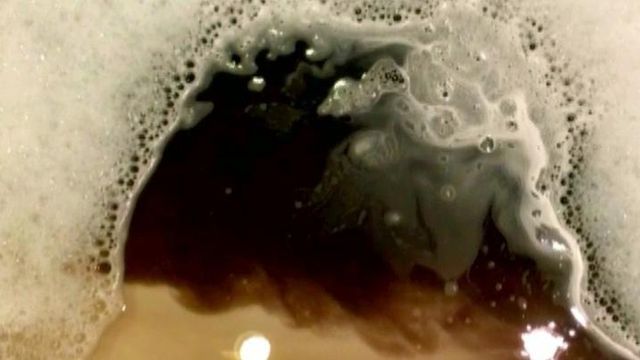'Don't drink the water': Rust-colored water plagues North Raleigh residents
Discolored water has become a way of life for thousands of people in Raleigh who get their water from Aqua North Carolina, a private well company that serves 51 counties from the mountains to the coast.
Posted — Updated“It went from reasonably clear to almost brown,” he said.
Discolored water has become a way of life for thousands of people in Raleigh who get their water from Aqua North Carolina, a private well company that serves 51 counties from the mountains to the coast.
More than a quarter million people depend on Aqua for clean drinking water, but homeowners in a troublesome pocket of North Raleigh say that’s not what they’re getting. Many refused to drink the rust-colored water and say it has ruined appliances, corroded fixtures and stained toilets and sinks with black sediment.
The homeowners say they blame not just the company but state regulators for not demanding a fix. WRAL Investigates found that help is on the way, but it comes with a cost.
The Booths say their water started looking bad more frequently last fall. It’s so unappealing, they say, they won’t even give it to their dog.
“I don’t think anybody would like to get a clean glass of water out of their faucet and it looks like a cup of tea that’s been steeping for a couple of days and say, ‘Oh, this is clean,’” said Patsy Booth.
The Booths’ home, which is on the Coachman’s Trail well system, where they’ve lived for 30 years, is hooked up to the Bayleaf Master System, which includes approximately 112 active wells that serve thousands of customers in North Raleigh.
“It’s kind of like you never know what you’re going to get,” Patsy Booth said.
The Booths, like many other homeowners on the Bayleaf system, won't drink the water they pay for.
WRAL Investigates sat down with the head of Aqua to see if he would drink what's coming from the wells he oversees.
“I get asked that pretty regularly, and my answer is, ‘No, I wouldn’t,’” said Aqua President Tom Roberts.
Aqua North Carolina began operating in 2004 after purchasing existing utilities. Roberts says he understands the frustration, but says his company's first focus is providing water that passes the U.S. Environmental Protection Agency’s drinking water standards.
“Our number one priority is primary water quality (and) health-related issues,” Roberts said.
Under current standards, the discolored water is not a primary violation. Instead, it's caused by high levels of iron and manganese in the groundwater, which is a secondary violation, something state law says Aqua does not have to fix unless the levels are deemed to be extreme. However, the state water quality rules are not clear on the solution to fix the problem.
After hearing years of complaints and state filings that show iron and manganese levels are, at times, 10 to 15 times too high, Aqua is finally installing special filters at well sites that will remove the iron and manganese.
“We heard them loud and clear, and that’s why we went to the legislature and worked with them to educate them as for the need for the surcharge that would incentivize us to do these kinds of projects,” Roberts said.
What that means is Aqua will make the necessary upgrades, but customers are footing the bill. Aqua can charge more because of a new state law that allows utilities to hike rates for water system improvements without going through the normal, lengthy hearing process.
North Carolina Attorney General Roy Cooper fought the new state law.
“I think good, decent water is a necessity and not a luxury,” he said. “It ought to be more difficult to get a rate increase if the performance hasn’t been there.”
Cooper says the law benefits Aqua, while silencing customers about water concerns.
“I think the frustration you’ve seen is that you’ve seen over the years a number of substantial rate hikes without improvement in the quality of water,” Cooper said.
Of Bayleaf's 121 wells, four are now equipped with the new filters, paid for by the new rate hike.
“We’re going to spend, and we’re going to try to fix these problems,” Roberts said.
Homeowners like Joe and Patsy Booth will soon see some relief. Aqua is installing a $4 million filter on the well that serves their home. But until the tap runs clear, Patsy Booth says there’s no way that water is going in her body.
“Is it a matter of life or death? Probably not, but who knows. I’m not going to drink that water,” she said. “You know that old saying, if you go out of the country, don’t drink the water? You come to North Raleigh, don’t drink the water.”
Under the new state law, Aqua can raise rates system wide as much as 5 percent to cover the cost of the improvements. The rate hikes for improvements are on top of regular rate increases that Aqua requests every three or four years.
The full North Carolina Utilities Commission hears those rate hike cases. It appears the customers themselves are partly to blame for Aqua’s continued growth and the rate hikes approved by the commission. During the last two rate hike cases in Raleigh, only five customers showed up to testify to the commission about their concerns with the water quality.
• Credits
Copyright 2024 by Capitol Broadcasting Company. All rights reserved. This material may not be published, broadcast, rewritten or redistributed.






